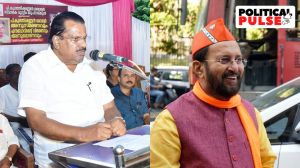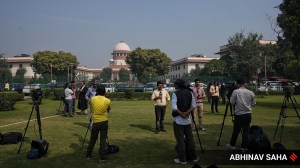- India
- International
‘World doesn’t celebrate India’s achievement in climate tech enough’: COP26 president Claire Perry O’Neill
COP26 president Claire Perry O’Neill said, “We‘d love to work with India, we have learnt so much in the last two years about how you might align climate risk analysis with financial support."
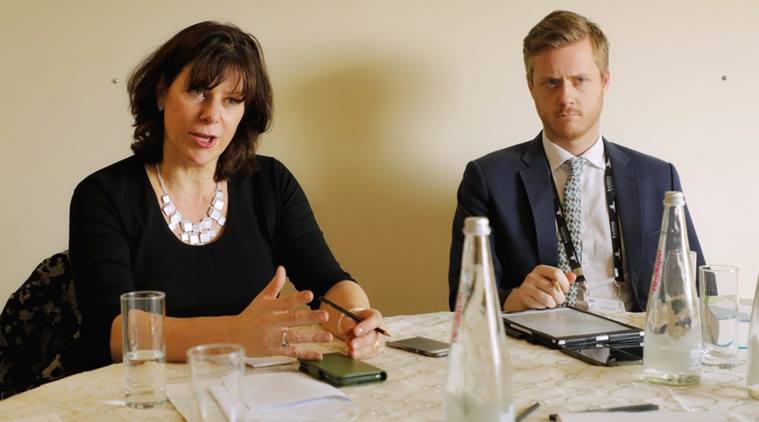 COP26 president Claire Perry O’Neill was in the national capital to discuss her role as the head of the annual climate talks to be held in Glasgow, UK this year. (Source: British High Commission)
COP26 president Claire Perry O’Neill was in the national capital to discuss her role as the head of the annual climate talks to be held in Glasgow, UK this year. (Source: British High Commission)
Claire Perry O’Neill, president of the 2020 UN Climate Change Conference (COP26), has expressed confidence in India’s crucial role in the climate negotiations and admitted that the “world doesn’t celebrate some of its technological solutions enough”.
“You have some of the most ambitious technological solutions being proposed, for example, how to produce low carbon cement, we don’t celebrate that enough. We don’t celebrate enough India’s work in areas like cooling, which is a huge global need for the world. So as well as the negotiations, we are going to treat the UK COP as an opportunity to celebrate and to measure all of the other contributions that are being made to reduce emissions,” O’Neill said.
“We‘d love to work with India, we have learnt so much in the last two years about how you might align climate risk analysis with financial support and that is the missing link that ultimately we all know it should be cheaper to finance sustainable infrastructure but we haven’t quite yet got the financial tools to express that,” she added during an interaction in New Delhi this week.
The 26th meeting of the Conference of the Parties (COP 26) to the UNFCCC will take place in November 2020, in Glasgow, UK.
As the ghost of Madrid looms large over this year’s annual UN climate talks, O’Neill has a challenging task ahead of her, but exuded a renewed sense of confidence as she underlined her ongoing efforts to cobble up support from governments to accelerate climate action. “It was a very negative atmosphere in Madrid, it made me realise that the job of a negotiator is very tough sitting in those rooms, almost 20 hours a day,” said O’Neill.

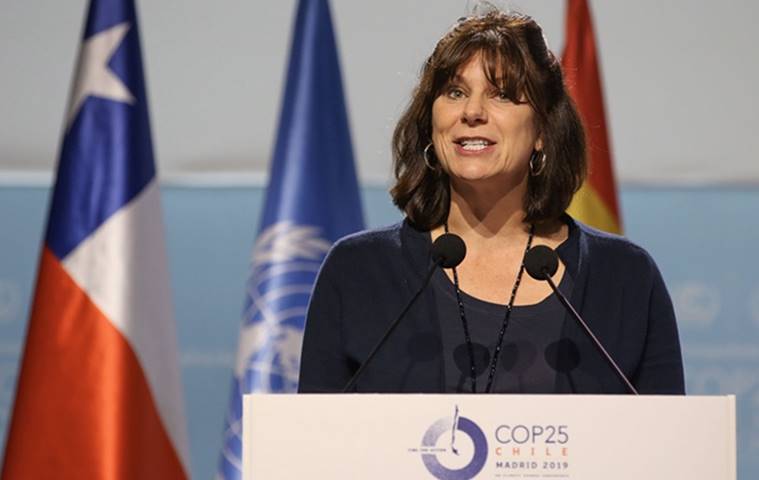 Claire Perry O’Neill said she has consulted extensively with ‘almost every previous UN climate talk president who are part of the present COP advisory team’ to garner support. “ (Source: Twitter/@Cop26President)
Claire Perry O’Neill said she has consulted extensively with ‘almost every previous UN climate talk president who are part of the present COP advisory team’ to garner support. “ (Source: Twitter/@Cop26President)
Also Read: Explained: What carbon numbers mean for climate target
This year’s meeting is being dubbed as one of the most crucial since the 2015 Paris agreement and O’Neill has a critical role to play in ramping up climate ambitions. The protracted negotiations in Madrid last year delivered a weak outcome and failed to resolve core issues such as trading in carbon credit markets and providing financial assistance to developing countries for climate damages, among others.
‘Have to change the dynamics of negotiations’
And while there’s a big lesson to learn from Madrid, O’Neill hopes to infuse positivity into the summit akin to the 2015 Paris agreement. “The advice I am taking, and it is consistent with what we all feel, is we have to change this dynamic of negotiations, they are increasingly departing from Paris,” she said. She’s also prepared to bridge the yawning gap that emerged in Madrid not only between governments but also in negotiations that failed to embed global public demands for resolute climate action, a situation that was described by the United Nations Secretary-General Antonio Guterres as an ‘important opportunity lost’.
<p “width=420″ lang=”en” dir=”ltr”>I am disappointed with the results of #COP25.
The international community lost an important opportunity to show increased ambition on mitigation, adaptation & finance to tackle the climate crisis.
But we must not give up, and I will not give up.— António Guterres (@antonioguterres) December 15, 2019
To begin with, O’Neill said she has consulted extensively with ‘almost every previous UN climate talk presidents who are part of the present COP advisory team’ to garner support. “There’s always a bad COP before a good COP,” she said, adding that as the COP president, she will do two things: “Find positive things that we can agree on and there are some new things we can introduce into the process. Crucially, something that is emerging is the disconnect between what the negotiators are saying and what the home countries are saying and doing.”
This growing disconnect was reflected in the bickerings between the developed and the developing countries during the Madrid talks, especially over the pre-2020 climate commitments. Developing countries such as India, China and Brazil had resisted attempts made during the Madrid summit to get all countries to update their Nationally Determined Contributions (NDCs) by 2020. Developing countries argued that developed countries should first deliver on their past and present promises before making new ones and fulfil their obligation to provide finance and technology to the former. “It’s an important question and relates to the issue of common but differentiated responsibilities,” said O’Neill.
UK to encourage countries to pass net-zero carbon legislation
On this front, O’Neill, who was the UK’s former energy minister and instrumental in the passage of the net-zero legislation in her country, will be outlining measures in the next few months that would “define what we believe success should look like at the COP”. “We need to encourage as many countries who are able to pass the net-zero legislation. I was able to take the legislation through in the UK because we had gone through a very significant energy transition away from coal. We did that through a combination of substituting lower carbon gas through a rapid build-up of renewables, with a big contribution from biomass. We have gone through the energy transition that we know all countries now want to do, including India. But we did it in a long period of time,” she said.
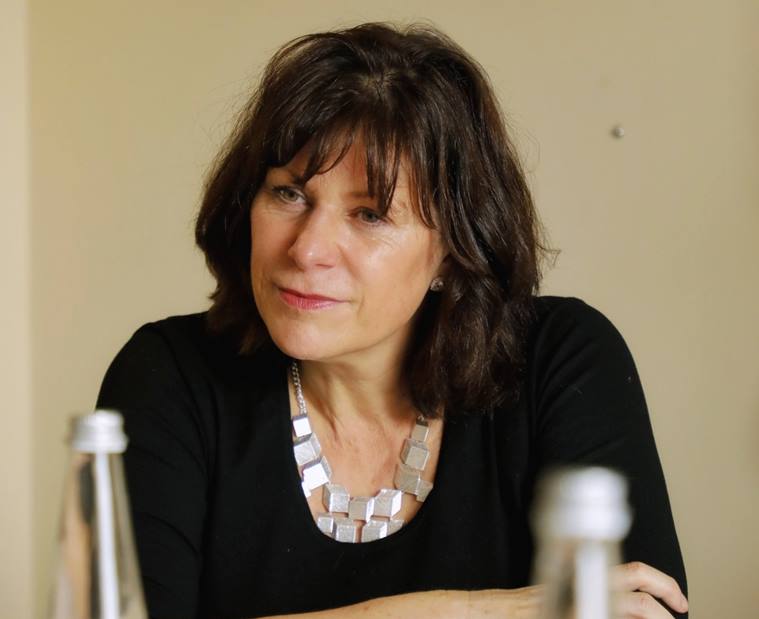 Claire Perry O’Neill, president of the 2020 UN Climate Change Conference (COP26). (Source: British High Commission)
Claire Perry O’Neill, president of the 2020 UN Climate Change Conference (COP26). (Source: British High Commission)
More importantly, to seal the trust deficit between the developed and developing world over climate obligations, O’Neill said it’s incumbent on all developed countries, where possible, to bring forward that net-zero legislation and “to reassure the developing world that we are not asking countries to set their feet on pathways that we are not prepared to go down ourselves.”
“Better integration between climate recovery, development policies needed”
In the same vein, while there’s a lot of talk on ramping up climate ambitions, the integration of national development policies with climate recovery plans leaves much to be desired, from developed as well as developing countries’ perspective. “We have to think about not as either or but both and. It seems to me if you have policies that if you’re building infrastructure that your country needs or although all our countries need for development, if you build it in a climate resilient way: A) it would be more robust so you won’t have roads collapse and railways wash down and buildings go down, people lose their lives and B) it will be cheaper because you won’t be burning the next generation with the cost of rebuilding but it seems to be spending now or innovating now to generate that technology at an acceptable cost can only be a good thing for long term development.”
She also acknowledged that the urgency to address climate action is lacking despite the Intergovernmental Panel on Climate Change (IPCC) warning that going beyond 1.5 degrees Celsius above pre-industrial levels means the “bringing of even wider-ranging and more destructive climate impacts”. “So the question about what we should be doing, I mean my daughter is a next-gen extinction rebellion protester (laughter), you know she has a placard and she says “you’re just not doing enough” and I am saying “I’m doing whatever I can”. But the question is why it is not recognised widely, I think it is because CO2 is quite a hard thing to think about. When I first asked my officials what does a tonne of CO2 look like and they said ‘at what atmospheric pressure’ minister? But think of the core disbenefit. So we talk a lot about air quality, stress on water supply, we talk about pressure on food supplies, we talk about health problems and these are the things that start to resonate with people. And it is very striking how the bushfires in Australia have started to I think bit of create a sea change in attitudes generally down under it. But we don’t want to wait for climate crisis for that to happen,” she emphasised.
Over the next few months, O’Neill plans to “use the global convening power of the COP to bring many positive action moments together” and that would form the basis of their work in the years to come.
Apr 26: Latest News
- 01
- 02
- 03
- 04
- 05

















